Safeguard your mobile device’s security by using strong authentication such as fingerprint or two-factor methods, and create robust alphanumeric passwords. Keep your software updated to protect against vulnerabilities and malware. Always use a VPN on public Wi-Fi and avoid unsecured networks. Regularly manage your app permissions, limiting access to essential functions only. Don’t forget to back up your data frequently using cloud storage or external drives. Taking these steps guarantees your device stays protected and your data secure. Discover more tips to fortify your mobile device.
Use Strong Authentication
To enhance your mobile device’s security, use strong authentication methods like biometric features and two-factor authentication. Fingerprint authentication offers a secure and convenient way to access your device, reducing the risk of unauthorized entry.
Implementing two-factor authentication (2FA) adds another layer of protection by requiring a second form of verification, such as a code sent to your phone. This means even if someone guesses your password, they can’t access your device without the second factor.
Additionally, create strong passwords using a mix of alphanumeric characters. This complexity makes it harder for attackers to crack your credentials.
Enable device encryption to safeguard your data, ensuring that only you can access it, even if your device is lost or stolen.
Update Your Software
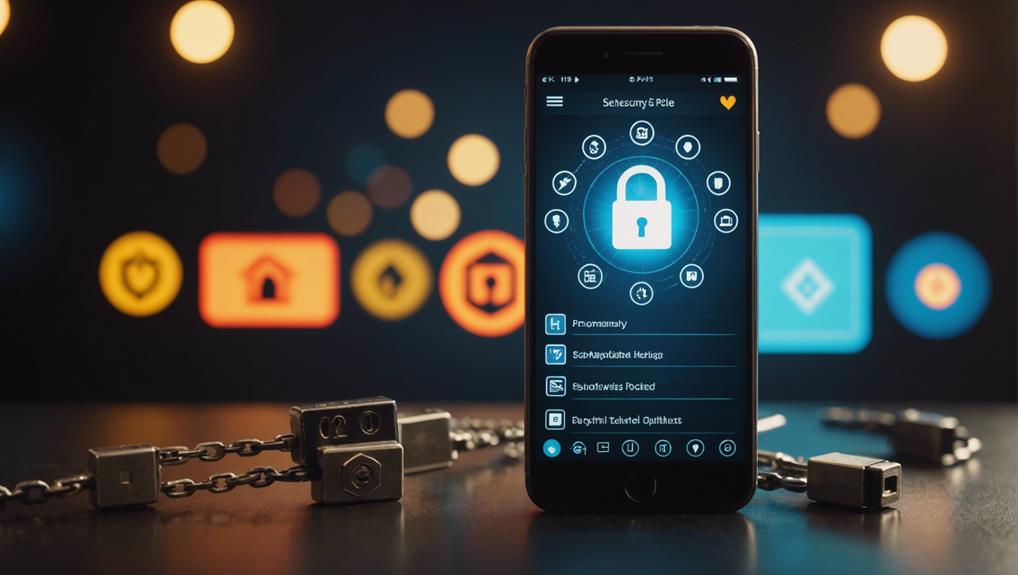
Updating your software is one of the simplest yet most effective ways to protect your mobile device. Enable automatic updates to make sure you don’t miss important patches and regularly check for updates to stay ahead of potential threats.
Enable Automatic Updates
Keep your mobile device secure by enabling automatic updates to guarantee it always has the latest security patches and bug fixes. Doing so helps protect your device from vulnerabilities cybercriminals could exploit to access your information. Regular updates reduce the risk of malware infections, data breaches, and other threats targeting outdated systems.
Automatic updates save you time and effort, ensuring your device receives critical updates without manual intervention. Here’s how it benefits you:
- Enhanced Security: Protects against newly discovered vulnerabilities.
- Time Efficiency: Updates occur seamlessly in the background.
- Data Protection: Safeguards personal information from breaches.
- Peace of Mind: Keeps your device ahead of potential security risks.
Enable automatic updates to maintain the privacy and security of your mobile device.
Check for Patches
Regularly checking for software patches guarantees that your mobile device stays protected against the latest security threats. Software updates often include important security patches that fix known vulnerabilities, enhancing your device’s overall security.
If you overlook these updates, your device can become susceptible to malware, data breaches, and cyber attacks. By staying current with patches, you greatly reduce the risk of unauthorized access to your personal information.
Outdated software is a hacker’s playground, so don’t leave your device vulnerable. Make sure you’re checking for updates frequently and installing them promptly. Setting up automatic updates can streamline this process, ensuring timely installation without manual intervention.
Mastering this habit fortifies your device against evolving cyber threats, safeguarding your digital life.
Update Regularly
To maintain robust security for your mobile device, make sure you’re consistently updating your software to patch vulnerabilities and fend off cyber threats. Regular updates often include essential security patches and bug fixes that enhance your device’s defenses against malware and hacking attempts. Neglecting updates can leave your device more vulnerable to breaches.
Here’s how to stay ahead:
- Enable Automatic Updates: Set your device to automatically install updates, ensuring you don’t miss vital security enhancements.
- Check for Updates Manually: Regularly verify if there are any pending updates.
- Update Apps: Don’t forget to update your apps, as they can also contain security fixes.
- Backup Your Data: Before updating, always back up your data to prevent any loss.
Secure Your Connections
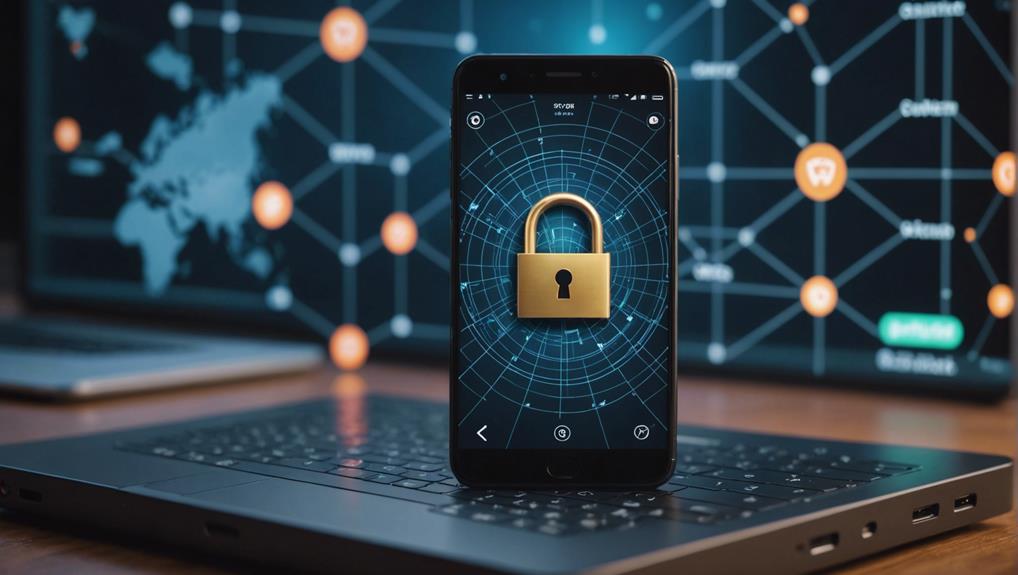
When you connect to public Wi-Fi networks, using a VPN is crucial to encrypt your data and protect against cyber threats.
Avoid unsecured Wi-Fi networks to prevent unauthorized access.
Before connecting, verify the authenticity of Wi-Fi hotspots to avoid falling victim to fake networks.
Turn off automatic Wi-Fi connections to prevent your device from connecting to unknown networks without your knowledge.
Enable secure browsing protocols like HTTPS to guarantee data safety.
Use reputable browsers for added protection.
By taking these steps, you’ll secure your connections and safeguard your sensitive information from prying eyes.
Master these practices to enhance your mobile device’s security and maintain privacy in an increasingly interconnected world.
Manage App Permissions
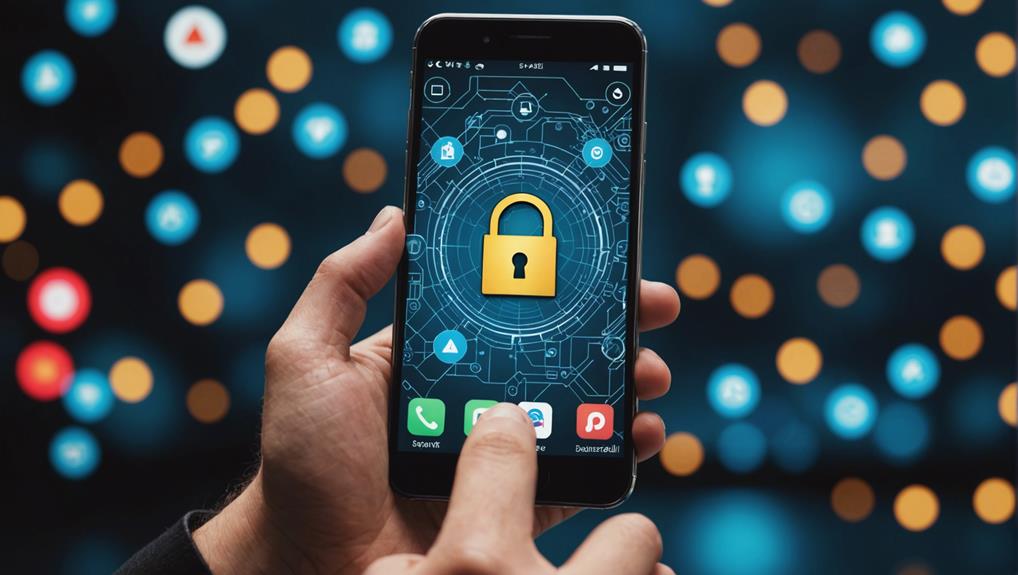
Managing app permissions is essential for safeguarding your personal data and maintaining your privacy. Regularly reviewing and managing app permissions allows you to control what data apps can access on your device.
Be wary of apps requesting unnecessary permissions, such as access to your contacts or location. To enhance your security, limit permissions to only essential functions.
Here’s how:
- Review permissions regularly: Check what data each app can access.
- Be cautious with new apps: Before downloading, scrutinize the permissions they request.
- Revoke unused permissions: Disable permissions for apps you don’t use frequently.
- Limit permissions: Only grant access to data that the app truly needs.
Backup Your Data
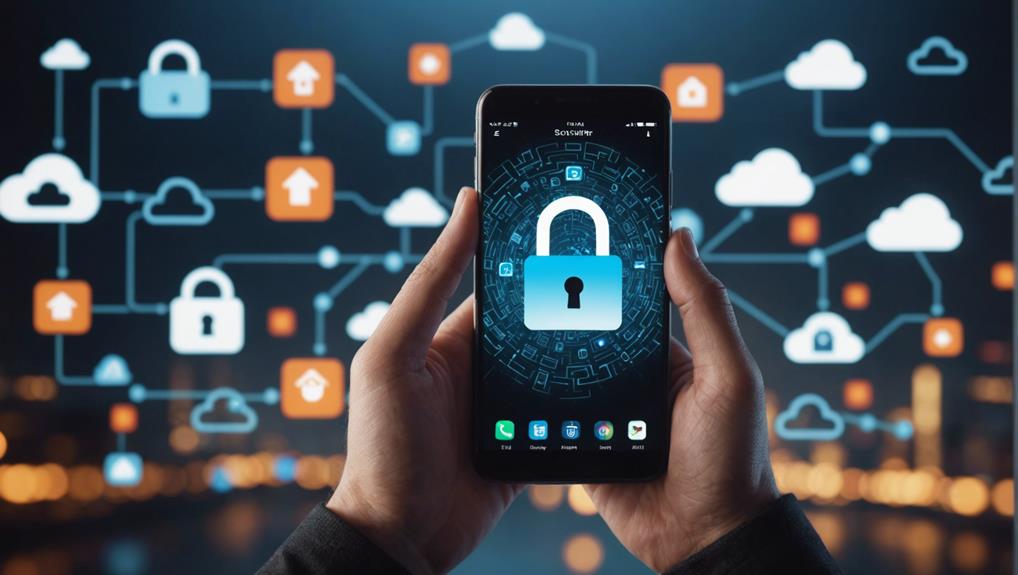
Backing up your data is essential to guarantee you don’t lose important information in case your device is lost, stolen, or damaged. Regular backups protect you from permanent data loss, ensuring that you can recover crucial information even in catastrophic scenarios. Utilize cloud storage services or external hard drives for secure backups.
For maximum efficiency, set up automatic backups so your data is consistently protected without needing manual intervention. Aim to back up your data at least once a week to keep everything up-to-date. This proactive approach not only safeguards your information but also provides peace of mind, knowing that your data remains intact and recoverable under any circumstances.
Install Security Software
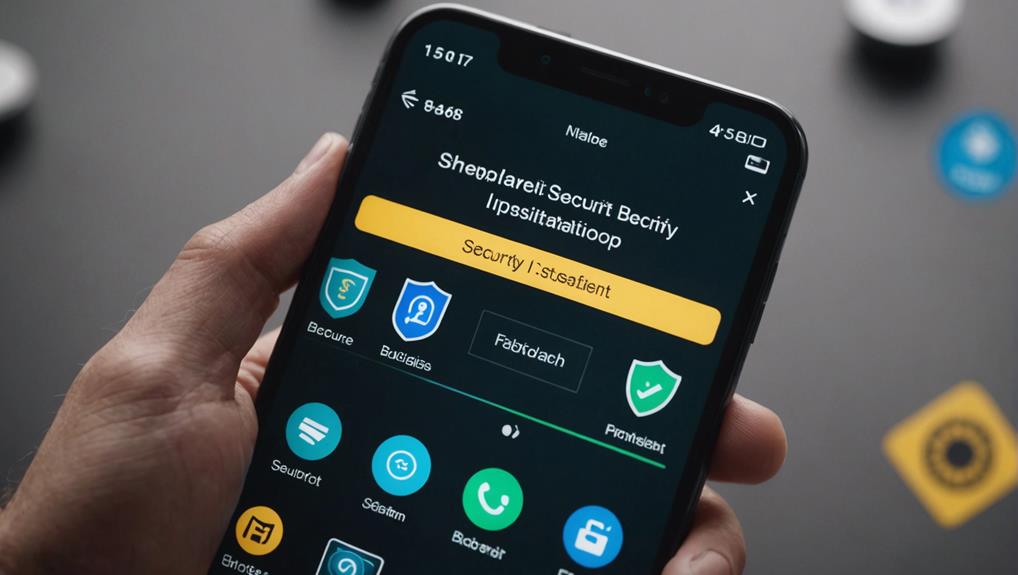
Having a reliable backup is important, but you should also install security software to protect your mobile device from various cyber threats. Installing security software, like antivirus apps, shields your device from malware, phishing attacks, and unauthorized access. These apps scan for threats, detect malicious activity, and provide real-time protection.
To enhance your mobile device’s defenses, follow these steps:
- Choose a reputable antivirus app: Select one known for its robust protection and regular updates.
- Activate real-time protection: Guarantee the app actively monitors your device for threats.
- Utilize additional features: Look for apps offering data encryption, secure browsing, and anti-theft protection.
- Regularly update the software: Keep the app up-to-date to defend against evolving cyber risks.
Conclusion
To conclude, you can greatly enhance your mobile device’s security and privacy by taking a few proactive steps. Use strong authentication methods and always keep your software updated.
Guarantee your connections are secure, carefully manage app permissions, and regularly back up your data. Don’t forget to install reliable security software.
By following these tips, you’ll protect your personal information and enjoy a safer mobile experience. Stay vigilant and proactive—your privacy depends on it!
Frequently Asked Questions
1. How can I secure my mobile device?
To secure your mobile device, make sure to enable security features such as fingerprint or passcode authentication. Keep your device’s operating system and apps updated, use a reliable antivirus software, and avoid connecting to unsecured wi-fi networks.
2. What are the common mobile security threats?
Common mobile security threats include malware attacks, phishing attempts, unauthorized access to personal information, and lost or stolen devices. It is essential to protect your information from falling into the wrong hands.
3. What are the best security measures to protect my mobile device?
The best security measures include using strong passwords, encrypting sensitive information, being cautious with app permissions, and utilizing a virtual private network (VPN) when connected to public wi-fi networks.
4. How can I enhance the security of my mobile phone?
To enhance the security of your mobile phone, consider installing security software that offers reliable protection against various security threats. Stay informed about security risks and follow best practices for mobile security.
5. What is the importance of encryption for mobile device security?
Encryption plays a crucial role in ensuring the privacy and security of data on your mobile device. It helps protect your information from malicious software and cybercriminals by converting data into a coded format that can only be accessed with the right key.






